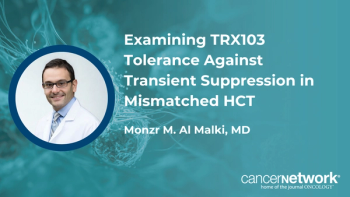
New Hope for Advanced Sarcomas
New hope for advanced sarcomas
Naveed Saleh, MD, MS
Apatinib treatment demonstrated objective efficacy in advanced sarcoma patients, according to the results of a study published in Anti-Cancer Drugs.
“Treatment strategies for sarcomas can be complex, as sensitivity to chemotherapy is variable, and tumor recurrence or metastasis to vital organs is typically inoperable,” wrote authors, led by Yao Weitao, MD, Bone and Soft Department, the Affiliated Cancer Hospital of Zheng Zhou University, Henan Cancer Hospital, Zhengzhou, China. “Overall, patients with recurrent or metastatic sarcomas have low 5-year survival rates. Therefore, novel therapeutic strategies are needed for sarcomas.”
The current single-center study was a prospective, open-label, nonrandomized clinical trial of apatinib used as a single agent to treat patients (n=45) with relapsed or metastatic bone soft tissue sarcomas (BSTSs) following failure with first-line chemotherapy. The study’s goal was to assess the efficacy and safety of apatinib as salvage treatment for advanced bone and soft tissue sarcomas.
Following dosing with apatinib, progression-free survival (PFS), overall survival (OS), objective response rate, disease control rate, and treatment-related adverse events (AEs) were analyzed. Subjects were given apatinib for at least 1 month, and median follow-up time was 6 months (1–13 months).
The median PFS was 7.88 months, with a 3-month PFS rate of 66.44%. The longest PFS of 13 months was exhibited in a patient with epithelial sarcoma. The median OS was 11.64 months, which varied by disease subtype. In total, four patients attained a partial response, and 36 patients attained stable disease. The objective response rate was 8.88%, and the disease control rate was 88.89%.
Grade 3/4 treatment-related AEs included hypertension (12.50%), hand–foot syndrome (6.67%), diarrhea (12.50%), fatigue (6.25%), and proteinuria (14.29%). One patient experienced a severe drug-related AE 2 months post therapy in the form of thrombocytopenia.
Due to the rarity and heterogeneity of BSTSs, multidisciplinary approaches are adopted, with surgery plus or minus adjuvant therapy being the primary treatment for early-stage, localized, and resectable soft tissue sarcoma, per the European Society for Medical Oncology and the European Sarcoma Network Working Group. Of note, reported 5-year survival was 80% at this early stage.
Systemic chemotherapy plays an important role in the multidisciplinary care of patients with BSTSs-especially in patients with localized, inoperable disease, or metastatic disease. These chemotherapies include cytotoxic agents such as anthracycline (ie, doxorubicin) with or without ifosfamide.
In spite of novel multidisciplinary therapies, recent 5-year survival rates have been unchanged-particularly in metastatic or recurrent advanced disease, with a 5-year survival rate of about 10% and a median overall survival of approximately 15 months.
According to the literature, vascular endothelial growth factor (VEGF) and its receptor (VEGFR) contribute to persistent angiogenesis of sarcomas and play important roles in tumor progression, invasion, and metastasis. Therefore, targeting tumor angiogenesis is hypothesized to be an important antitumor therapeutic approach. Indeed, tyrosine kinase inhibitors (TKIs) targeting VEGFR have been clinically developed and have shown antitumor activity in a number of malignancies.
Apatinib is a new, small molecule receptor tyrosine kinase (RTK) inhibitor that selectively competes for the VEGFR-2 ATP-binding site, resulting in the blocking of downstream signaling and inhibition of tumor angiogenesis. By means of VEGFR inhibition, apatinib conveys antiangiogenic and antitumor effects in various tumors. Notably, this drug has already been approved in China to treat metastatic gastric cancer, and published reports detail therapeutic use for osteosarcoma and soft tissue sarcomas, including angiosarcoma, malignant fibrous histiocytoma, and myxoid or round cell liposarcoma.
“Apatinib treatment in our study exhibited objective efficacy in PFS, OS, and manageable toxicity in patients with advanced sarcoma,” concluded the authors. Furthermore, they stress that the results of the current study bolster the need for “future randomized controlled trials to further define apatinib activity in stage IV sarcomas.”
Newsletter
Stay up to date on recent advances in the multidisciplinary approach to cancer.










































